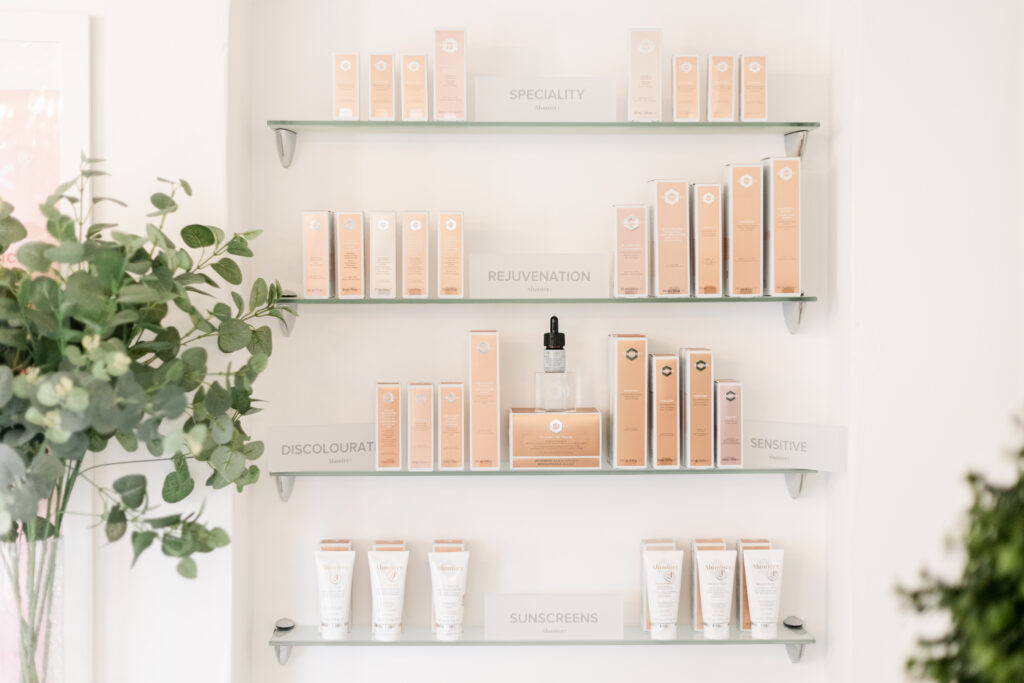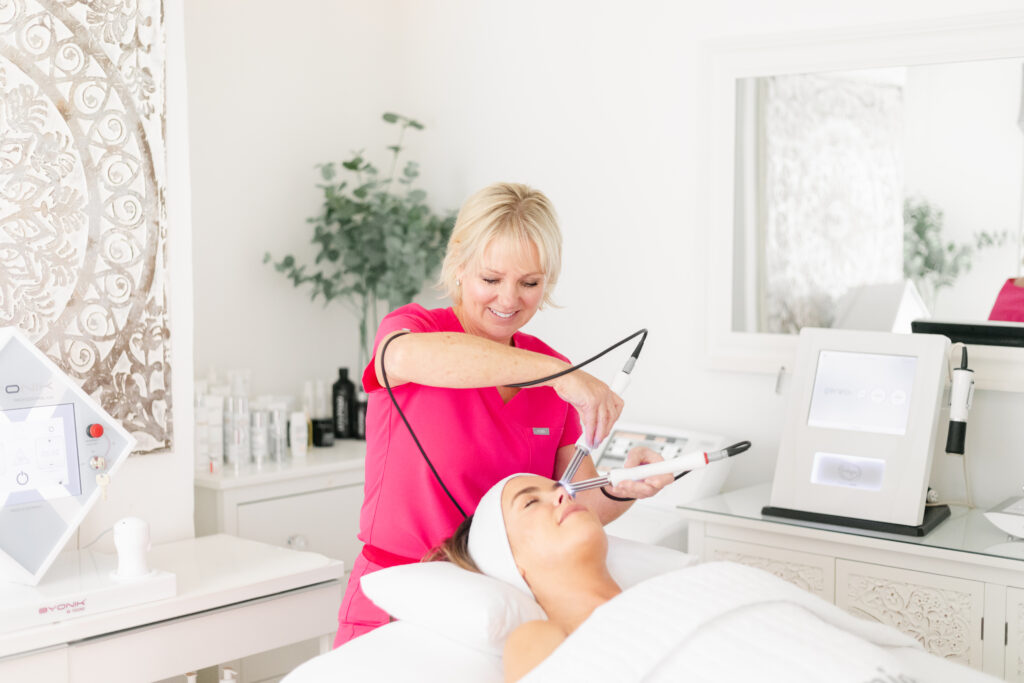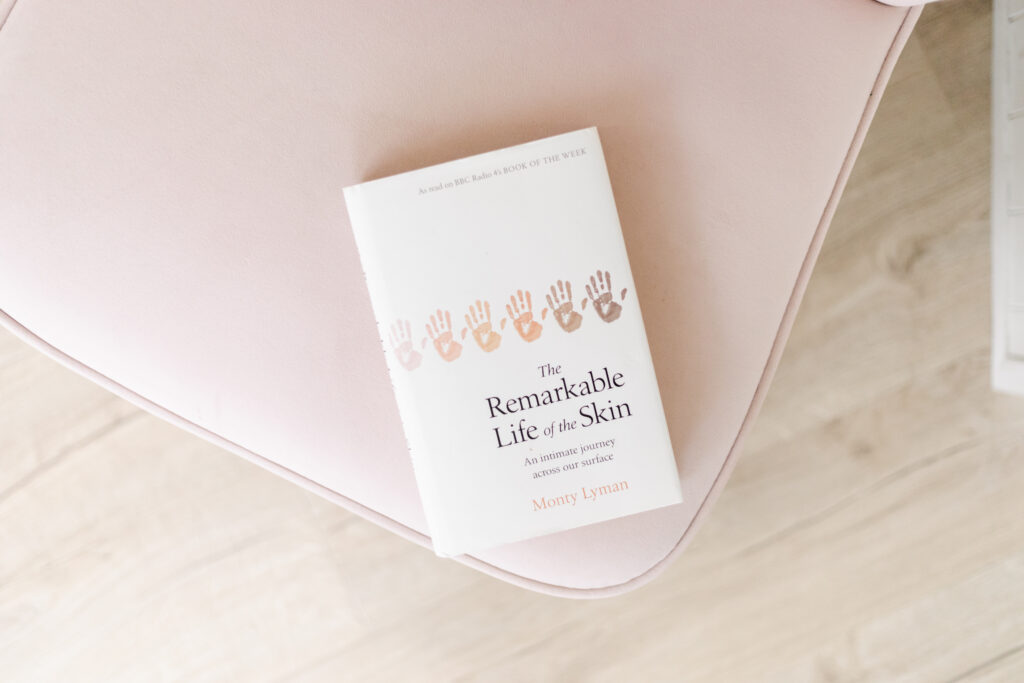Menopause And Skin Problems
February 21, 2024
Menopause and how it affects the skin is something that often pops up in conversations. The ‘M’ word is an inevitable phase in every woman’s life. It can be stealthy-steadily creeping into our life or it can strike suddenly from nowhere, with no regard for age. All too often it’s a taboo subject that people shuffle around or laugh uncomfortably about menopause symptoms and the distress it can cause.
Having gone into clinical menopause over 15 years ago immediately after a hysterectomy and subsequently put onto HRT, I know exactly how it feels physically and mentally. From the brain fog to the heat flush that rises from your feet (and always at the most inconvenient moment). I have lost count of the amount of times I have had a client in a deep relaxed slumber, mid-facial massage, to wake suddenly, kicking off the cloud-like duvet they have been contentedly snuggled under.
Everyone’s ‘M’ journey is different and so are the concerns that clients see on their skin. This is a conversation I have daily with the majority of my clients.
The main things that bother my clients are lines, wrinkles, loss of elasticity and loss of volume. Other concerns include jowls and deep creases in the nasolabial folds. These are swiftly followed by dry, sluggish, skin that lacks the luminous glow of youth. So why is this? What happens in the skin for it to want to move south? As a client said recently, ‘My face looks like it needs propping up and ironing!’
So let’s understand menopause and skin problems a bit more in this blog.

Is The Menopause Starting: What Happens As We Age
As we get older our estrogen levels start to drop. Oestrogen is a hormone. Hormones are complex and control many functions in our body. Oestrogen is a primarily female hormone and when imbalanced, it reflects on the skin very quickly. Having too much can cause acne and constipation and has been linked to more serious diseases such as breast cancer. Not producing as much, as in menopause, creates a cascade of events in the skin. For example, estrogen plays a huge part in hydration within the dermis of the skin, which is needed by cells together with oxygen for ‘life’. Lack of hydration slows down cell renewal, regeneration and even the natural exfoliation process. This leaves the skin looking dull, lifeless and less plump. Collagen and elastin which are also found in the dermis need hydration to remodel and work effectively.
Collagen Production for menopause and skin problems
Our bodies peak around the age of 25 for collagen production, which then progressively slows down from there. Collagen gives the skin plumpness, and volume and that cushion-like fullness to the skin. There are many different types of collagen. Types I and III are the most important with regards to the skin, ageing and scarring (and in the regeneration of collagen synthesis).
For collagen to be produced it needs a good supply of water and hyaluronic acid, both of which decline as estrogen levels drop. This means that good quality collagen proliferation doesn’t happen and therefore less collagen is found in the skin. This shows in the facial contours dropping, with lines and wrinkles predominating where the collagen has broken down significantly in those areas. Sometimes sugars can crystallise around the collagen fibers making them brittle, showing on the skin as a telltale criss-cross pattern. This is also a sure sign that the elastin fibers that give the skin its spring-back coil are damaged. Collagen and Elastin are BFFs supporting each other and both benefit from being a team.

Improving Menopause And Skin Problems
So what can be done to improve these concerns? Firstly it won’t be an overnight result, and if anyone says it is, walk out the door! Why? Collagen synthesis can take up to 12 months to transition and it needs a two-pronged approach for the best results. Good professional home care and professional treatments. Chances are you will see and feel a difference quite quickly, and it will be encouraging to see it getting better week by week, but it will be further down the line that the full benefits will be seen.
Products I recommend to use at home for Menopause And Skin Problems:
SPF – AlumierMD – There is no point spending money on products and treatments if you are not wearing a good quality separate SPF every single day. If this isn’t worn you are throwing your money away! SPF every day for life!
Retinol – AlumierMD. Retinol is Vitamin A and everyone should be using it to combat premature ageing unless you are pregnant or breastfeeding. You get what you pay for when it comes to this incredible ingredient. Encapsulation and a complex delivery system are needed to reach the dermis where collagen and elastin are found for it to work effectively, without causing surface aggravation. It should be introduced very gradually into your skin routine, but it truly is a game changer. It helps hydrate, promote collagen production, helps reduce pigmentation, strengthens elasticity, and speeds up cell renewal so skin looks dewy and luminous. I love Retinol!
Topical Vitamin C – AlumierMD Everactive. Just like retinol, you get what you pay for when it comes to Vitamin C. Vitamin C is very volatile and oxidises very quickly. This can happen even in the bottle/jar before you have even bought it, rendering the contents not effective or even active. Vitamin C is very anti-oxidant so this little ingredient is like a superhero with a power punch, stopping the baddy free radicals attacking the skin, causing oxidative stress and premature ageing of the skin trying to break down the collagen and elastin.

What Skin Treatments Would Help?
- Micro-needling with Exceed, SkinPen and COMCIT. Micro-needling creates thousands of micro channels into the skin causing a controlled trauma to the skin. This enables the skin to naturally regenerate itself and importantly remodel collagen from the all-important Collagen Type III to I to give the skin volume, plumpness, and firmness. This is an excellent treatment with very little downtime for the majority of clients.
- CollagenWave Radio Frequency. Radiofrequency tightens the skin, using heat. It’s a very relaxing treatment, no downtime. This helps with collagen and elastin and is great for contours and jowls. Radio Frequency and Micro-needling are a powerful combination together also.
- Pyramid Facelift uses fractional radio frequency and microneedling combined. This is one of the most popular solutions for Menopause skin concerns. It works on every layer of the skin for every sign of ageing.
- A-lift Nano, CACIMicro-current. Nano current activity recharges the skin cells batteries, increasing the ATP in the cells up to 500%, making the cells regenerate quickly, and behave and act younger. It gives skin a great glow. Micro-current works with the muscle using a current that is painless to lift, and tone. and firm the muscle.
- Peels. Peels will brighten the skin, and help with lines and wrinkles, pigmentation, luminosity, the natural exfoliation process, and hydration … I like to think they are like default buttons for the skin!
A combination of all of the above treatments and homecare is a great way of targeting those main concerns of menopausal ageing on the skin for optimum results. This will help in immediate and long-term results and benefits. Treating the skin from every angle to tighten, lift, plump, regenerate, improve overall skin health, give skin a glow and produce the crucial collagen that depletes as estrogen levels drop in menopausal skin.
Leave a Reply Cancel reply
Cancellation Policy
Contact
Book now
Website by Lains Creative
@2023 Andrea Simpson
"It's never just a Facial"
TO THE TOP
privacy policy
T&C's
cookies policy
The Skin Whispers